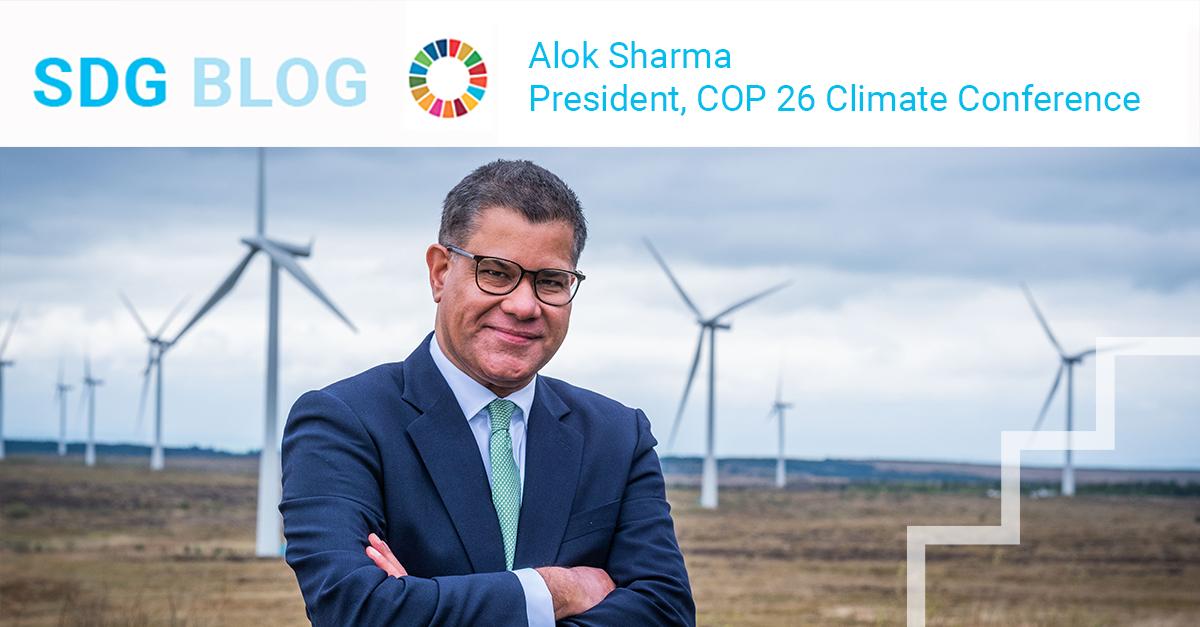SDG Blog

Together, we can change the way we power the world
By Alok Sharma, President of COP 26 Climate Conference
Solar changed Neville’s life. I saw this for myself when, as UK Secretary of State for International Development, I visited his home in Kenya, and he told me how off-grid solar power was helping him to study for his degree.
That’s just one example of how the global challenges we face are related. The Sustainable Development Goals (SDGs) recognise this, and energy is a great example. Among others, SDG7, Affordable and Clean Energy for All, supports the SDGs on Gender Equality, Decent Work and Economic Growth, and of course Climate Action.
Globally, the World Bank estimates that we could save 140 million working years, every year, if power freed people from the need to collect fuel and enabled them to cook faster. Tasks overwhelmingly performed by women and girls.
Renewables can bring reliable power to communities for the first time, spurring growth and development. As in Nigeria, where the government plans to use solar to connect 5 million households to reliable power for the first time.
And moving from polluting forms of power like coal to clean, green energy is essential if we are to avoid the very worst effects of climate change by meeting the goals of the Paris Agreement. In that Agreement, the countries of the world committed to limit the rise in global temperatures to well below 2 degrees centigrade, aiming for 1.5 degrees centigrade. We can’t achieve that without action on energy. And time is running out.
To keep the 1.5-degree limit alive we must halve global emissions by 2030. Action on power, which accounts for almost a quarter of global emissions, is vital. Analysis shows that to keep the 1.5-degree limit within reach, countries must move away from coal. That is why energy transition is a focus of COP26, and why one of my personal priorities is to consign coal power to history, in a manner that is fair to all. Including by supporting the transition in developing countries.
This is eminently achievable, not least because, as I have said before, the economic tides have turned and are sweeping the world towards a clean future. Solar and wind power are now cheaper than coal and gas around the world. Renewables create good, green jobs. And we can make the transition a just one, as shown by a deal to train an offshore wind construction workforce, recently signed by renewables firm Ørsted and North America's Building Trades Unions.
Globally, the clean energy transition is making progress. Under the UK Presidency, every G7 country has committed to move to an overwhelmingly decarbonised power system at home in the 2030s, and to stop financing coal abroad. South Korea is ending international coal finance too, meaning that two of the three largest funding nations are no longer putting their money into coal. And pension funds, insurance firms, and investors have signed up to the Powering Past Coal Alliance, which aims to accelerate the transition away from coal.
Last year, the UK COP26 Presidency launched the COP26 Energy Transition Council to enhance international collaboration and get the clean energy transition moving faster. This brings together more than 20 governments, and 15 international institutions, including development banks, to support the green transition in developing countries. We also launched the Rapid Response Facility, which is currently responding to over 15 country requests for timely, flexible support with their energy transition. And we plan to build on these initiatives beyond Glasgow, so that strong partnerships between governments, investors and communities continue to scale-up clean power, green grids and energy access.
All this progress is positive but there is further to go ahead of COP26. Because the clean energy transition needs to move much faster to meet the goals of the Paris Agreement, and unfortunately 480 gigawatts-worth of new coal power stations are still planned around the world.
Ahead of COP and at the summit itself, countries and investors need to step up with big, bold commitments to drive the clean energy revolution. So that we are able to end coal power globally. I urge countries to commit to end coal financing abroad, stop building new coal power plants at home, rapidly phase out existing ones, and support a just transition in coal-dependent communities.
Together, we can revolutionise the way we power the world, leaving no one behind. Spurring growth and development, while protecting our planet for future generations.
* The views expressed in this blog are the author’s and do not necessarily reflect the opinion of UN DESA.
 Welcome to the United Nations
Welcome to the United Nations